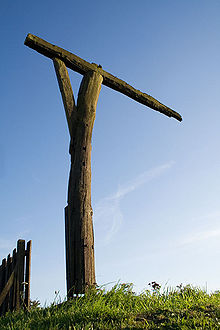Esther 5: 9-14
9 Haman went out that day happy and in good spirits. But when Haman saw Mordecai in the king’s gate, and observed that he neither rose nor trembled before him, he was infuriated with Mordecai; 10 nevertheless Haman restrained himself and went home. Then he sent and called for his friends and his wife Zeresh, 11 and Haman recounted to them the splendor of his riches, the number of his sons, all the promotions with which the king had honored him, and how he had advanced him above the officials and the ministers of the king. 12 Haman added, “Even Queen Esther let no one but myself come with the king to the banquet that she prepared. Tomorrow also I am invited by her, together with the king. 13 Yet all this does me no good so long as I see the Jew Mordecai sitting at the king’s gate.” 14 Then his wife Zeresh and all his friends said to him, “Let a gallows fifty cubits high be made, and in the morning tell the king to have Mordecai hanged on it; then go with the king to the banquet in good spirits.” This advice pleased Haman, and he had the gallows made.
Pride goes before destruction, and a haughty spirit before the fall. Proverbs 16:18
Sidnie White Crawford in her commentary on Esther wisely points out that anyone reading the book with knowledge of wisdom literature and particularly the book of Proverbs knows that Haman’s fall is approaching. (Elizabeth Acthemeier, et.al 1999, 3:911f.) Indeed Haman’s arrogance is massive but we still need to ask the question, “What is up with Mordecai?” Mordecai has been restored to his position, and knows at least some of the game that is at stake, but he still continues to openly show his defiance to Haman even while Esther is playing her subtle game. What is it with the men in this story? Why must they play the fool? Why must Mordecai continue to enflame Haman’s hatred and put himself at risk even when the plot is afoot? Before Mordecai thought it beneath him to deal with Mordecai individually, but now Mordecai’s defiance is enough to rob him of the joy and honor of having dined with the king and queen.
Like the king, when he is perplexed he calls together his friends and his wife Zeresh, who proves to be the independent thinker among the group rather than the assembled men. In an honor shame society it wouldn’t be uncommon to refer back to one’s honors as a way of establishing one’s position (even if we might look at it and think this guy must be full of himself) and yet everything is no good so long as there is one who can defy him. Now from a psychological perspective we would probably say that Mordecai has a weak sense of his own self and requires the constant honor and attention to probably feel valued, but that would be putting a 20th Century midset on the story- honor and shame is at stake and honor is power. It is Zeresh who supplies the solution which all the other sycophant friends agree to, to construct a gallows (gallows to us seems to indicate hanging, but it probably is referring to more of a gibbet, see the picture above, for impaling one’s enemy upon) that are outlandishly outsized (approximately 75 feet tall) designed to make a statement, “this is what happens when you mess with Haman”. Much the same message that the Roman (and other) empires would make later when they crucified people they felt were their opponents.
Ultimately capital punishment is about more than ending a person’s life, it is about fear and making an example of the person who is executed. The idea of impaling someone upon a gibbet and letting their body decompose in the open may be revolting, but the exhibition and the denial of a proper burial also points to the powerlessness of the person’s allies and family.

